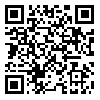Volume 29, Issue 6 (9-2022)
RJMS 2022, 29(6): 257-268 |
Back to browse issues page
Download citation:
BibTeX | RIS | EndNote | Medlars | ProCite | Reference Manager | RefWorks
Send citation to:



BibTeX | RIS | EndNote | Medlars | ProCite | Reference Manager | RefWorks
Send citation to:
Naghdi Bonehzamini M. The Impact of Web-Based Education on Academic Engagement and Psychological Well-being of Students During the COVID-19 Pandemic (Case Study: Male Second-Grade High School Students in Siahkal County). RJMS 2022; 29 (6) :257-268
URL: http://rjms.iums.ac.ir/article-1-9094-en.html
URL: http://rjms.iums.ac.ir/article-1-9094-en.html
Master of Educational Sciences and Psychology, Primary Education Major, Allameh Tabatabaei University, Tehran, Iran. , nagdi067@gmail.com
Abstract: (861 Views)
Background & Aims: The extensive transformations brought about by advancements in information and communication technologies in recent decades have reshaped various social, economic, and cultural structures. The education system, as a key institution in human growth and development, has not been immune to these changes. However, what suddenly and unexpectedly accelerated the pace of educational transformation to an unprecedented degree was the COVID-19 pandemic in recent years. School closures, social restrictions, and the necessity of physical distancing compelled educational systems worldwide to replace in-person methods with distance learning, particularly web-based education. This sudden and mandatory shift to the virtual space not only transformed the delivery of educational content but also paved the way for deeper changes in students' academic and psychological experiences. Although web-based education was able to partially compensate for the void created by school closures in the short term, over time, important questions arose regarding the quality, effectiveness, and psychological consequences of this type of education, especially for vulnerable groups such as students. One of the serious challenges in this regard was how virtual education could not only transmit content but also maintain students' motivation and enthusiasm for learning while simultaneously promoting their mental health. Adolescents, as a group in a sensitive stage of emotional, cognitive, and social development, require supportive and motivational environments, which are doubly vulnerable during crises like the COVID-19 pandemic. Therefore, a precise examination of the effects of web-based education on important aspects such as their academic engagement and psychological well-being is essential and scientific. Considering these discussions, the present study was designed with the aim of investigating the impact of web-based education on the academic engagement and psychological well-being of male second-grade high school students during the COVID-19 pandemic. This research seeks to achieve a more precise understanding of the psychological and motivational consequences of virtual education in crisis conditions by analyzing data from the studied statistical sample. The ultimate goal of this investigation is to provide scientific evidence for educational and psychological decision-making in similar future situations, as well as to improve the quality of blended learning design and implementation in the Iranian education system. In fact, this research aims to provide a scientific and practical answer to the important question of how the capacities of web-based education can be utilized to support students' academic and psychological development.
Methods: : The present research was descriptive and correlational in nature. The statistical population comprised all male second-grade high school students (11th grade humanities) in Siahkal County who were studying during the academic year 2020-2021. According to the statistics unit of the Siahkal County Department of Education, the total population was 270 students. A sample size of 155 individuals was selected using simple random sampling based on the Krejcie and Morgan table. The research instruments included a researcher-made questionnaire on web-based education, Fredricks et al.'s (2004) Academic Engagement Questionnaire, and Ryff's (1989) Psychological Well-being Scale. Pearson correlation coefficient was used for data analysis.
Results: The results indicated a positive and significant relationship (p<0.05) between web-based education and academic engagement, as well as between the subscales of academic engagement (i.e., behavioral engagement, emotional engagement, cognitive engagement) and web-based education, information quality, system quality, service quality, and e-satisfaction. Specifically, the correlation coefficient between the overall score of web-based education and academic engagement was 0.25, indicating a positive and significant relationship. Furthermore, the results showed a positive and significant relationship (p<0.01) between web-based education and psychological well-being. More precisely, the correlation coefficient between the overall score of web-based education and psychological well-being was 0.31. This value suggests that an increase in an individual's web-based education is associated with an increase in their psychological well-being.
Conclusion: The findings of this research demonstrated that web-based education during the COVID-19 pandemic had positive effects on two fundamental aspects of students' academic lives: academic engagement and psychological well-being. These findings suggest that the quality of the digital learning environment, beyond merely compensating for in-person instruction, can play an effective role in promoting students' mental health and academic motivation. In other words, appropriate virtual education was not only not a barrier to students' academic and psychological growth but also managed to increase academic engagement and simultaneously strengthen various components of psychological well-being by providing opportunities for active participation, learning autonomy, positive interaction, and experiences of competence. Therefore, web-based education, when aligned with psychological, motivational, and educational principles, can provide an effective platform for students' academic and psychological development. This result not only underscores the importance of reviewing post-COVID-19 educational policies but also highlights the necessity of sustained investment in infrastructure, high-quality digital educational content, and empowering both teachers and students in utilizing these platforms.
Type of Study: Research |
Subject:
Clinical Psychiatry
Send email to the article author






